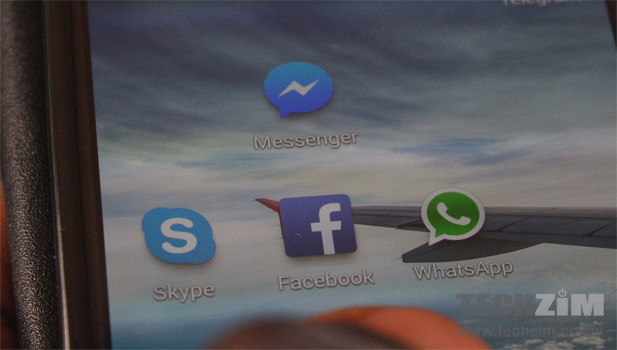It’s been almost a week since Zimbabweans experienced disrupted service on WhatsApp.
A lot of fingers were pointed at the government (The State firmly denied this) for something that some people viewed as a possible response to a nationwide stay away.
Despite all the controversies, accusations, and denials, one thing is clear – If WhatsApp, which is the most popular communication tool in Zimbabwe, is disrupted, there will still be a need to share information.
Fortunately, there’s a flood of instant messaging (IM) alternatives out there. If WhatsApp is shut down disrupted you should switch to the IM option that the majority of people you communicate with frequently are familiar with. Tehy can’t all be inaccesible at the same time.
Out of the more popular options we’ve listed 5 common IM platforms that are easy to use, provide a somewhat familiar user experience and have core features like VoIP calling and group chat which we are now fond of.
Messenger

Facebook’s own IM platform has the most appeal here because of its roots in the second most popular internet service in Zimbabwe plus it’s also beefing up its security and privacy settings. Facebook bundles will give you access so you don’t have to worry about extreme out of bundle data charges just to send multimedia. We wrote about it here as the leading alternative if WhatsApp ever gets blocked
Telegram

Despite failing to capture WhatsApp type user numbers Telegram is still one of the more visible and noteworthy IM services. It’s big on message security and privacy and has been opened up to third-party apps like bots leading WhatsApp in the adoption of essential messaging tools.

This multi-purpose service should probably be strongly encouraged locally in light of the cash shortages and the need for e-money options. Though the e-commerce features aren’t anything Zimbabweans can use right now it’s still a familiar service especially for people in diaspora markets like South Africa where it is promoted extensively.
Viber

It was overshadowed by the VoIP solutions that was introduced by practically every service but Viber has still maintained a strong presence. In fact, Zimbabweans who’ve been communicating with family and friends abroad for years were on Viber as a Skype alternative well before WhatsApp and Facebook became dominant.
Skype
 It’s been the iconic representation of video calling but it’s also got a chat feature that’s probably used more as a supporting office tool than anything else. You can still rely on it to maintain contact especially with business associates who might have moved the conversation to WhatsApp.
It’s been the iconic representation of video calling but it’s also got a chat feature that’s probably used more as a supporting office tool than anything else. You can still rely on it to maintain contact especially with business associates who might have moved the conversation to WhatsApp.

12 comments
Last week the shutdown affected internet access as a whole. Was thinking you would speak about VPN or something along those lines coz Messenger kana Telegram hazvibatsire if i cant access the internet all together
that’s true Trey, but as you’ve pointed out yourself, the “whole” Internet was shut down last time, so how exactly would a VPN help you when you can’t even go on Google?
Back to the topic admin, our problem here isn’t of the lack of apps in case WhatsApp is taken down, hell, I can even list 50 apps right now that can be used to replace WhatsApp, but the question is, are they easily accessible? do we have bundles for things like WeChat? and with internet still being a luxury here in Zim, how many people are there on Telegram… how many contacts do you have on Skype 3? 1? see my point??
How could glaringly leave out IMO which on my contacts is 2nd after whatsapp. I use it everyday for video calls and chats with almost 90% of my active contacts.
Except maybe messenger all the other apps here are not popular. They are as useless as free Zol to Zol calls because who are you going to call anywhere? They are even less useful considering their popularity. Whatsapp has an ecosystem already in place. Pple buy phones based on whether they are Whatsapp capable or not, scores of people make money setting up Whatsapp on people’s phones etc. You can talk to your in-laws or younger sister on the app. Everyone knows what it is.
Don’t ever close your mind to learning alternatives….the aeroplane came after the train which came after the car which came after the bicycle etc etc
I think the writer is not tech savvy, u did not give solutions here…was expecting u to tok abt VPN or anything that can overide the ban or blocking of watsapp
Viber and Skype will make ISPs like Econet very rich! Those two apps are soo data hungry your bundles will not last you 5mins
This is my take on this whole “shutdown” thing: it was certain providers and I simply think they buckled under the traffic pressure. I very much doubt eg Econet/web would follow some kind of Gvt orders. Personally I had no problems whatsoever but noticed that others had, say ZOL, Telone ADSL
simple sms does the trick 4 me
The heading should have been “Five alternatives to WhatsApp”. Poor article
Not helpful at all. Internet was shutdown not Whatsapp. The article should have been about alternatives to access internet when mobile data or wifi has been shutdown by these “hidden forces” which noone seems to have an explanation for. Give us useful info on what to do the next time this happens. coz no internet means no viber, no wechat, no skype etc……
Awesome article!!
You need to add Google Allo too in this list. That is the best alternative to whatapp.
Check Here http://behitech.com/2016/12/08/google-allo-much-better-whatsapp/